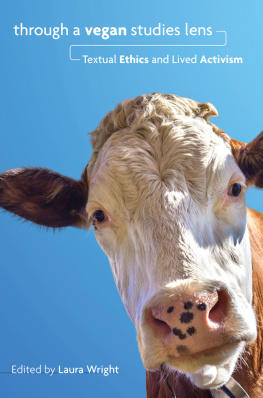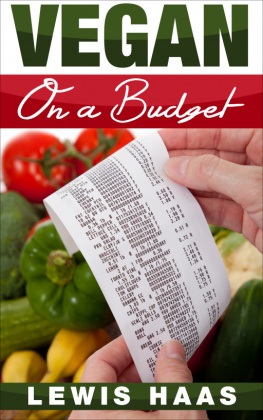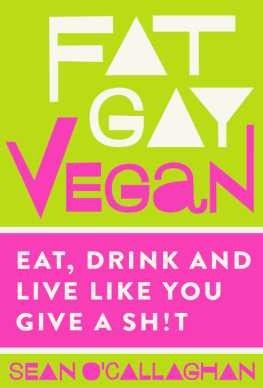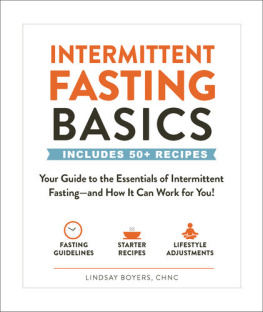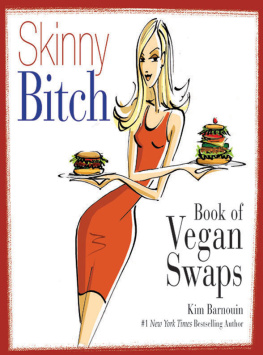Through a Vegan Studies Lens
CULTURAL ECOLOGIES OF FOOD IN THE 21ST CENTURY
Series Editors: Tom Hertweck (University of Nevada, Reno) and Iker Arranz (University of California, Santa Barbara)
As we move deeper into the 21st century, people around the globe have become increasingly aware of the way their food choices produce ecologies of effects, environmentally and otherwise. Cultural Ecologies of Food in the 21st Century invites manuscripts that, using a truly interdisciplinary framework, parse the complexities of contemporary food culture. Encompassing any characteristics of food and drink, from their agricultural or technological production to their traditional or market-based consumption, and including their systems of waste and the cultures of thought that surround them, works in the series will uncover how humanitys daily eating is constellated within and among diverse bodies of knowledge. Cultural Ecologies encourages the work of specialists who are eager to relate their learned understanding of eating to those outside their own discipline. From the politics, economics, and scientific practices of agriculture at any scale, to the systems of promotion, distribution, and consumption that make food salable, to the representational economies of value that tell us what is good to eat and when: any transdisciplinary approach that brings food into focus will be considered.
Of particular interest are those manuscripts that include deep place-based perspectives or the environmental effects of how we eat as part of their investigations, including those that attempt either to pose well the questions food scholars and real-world eaters must face as well as to answer the extant dilemmas of our time. The series also welcomes projects that tackle the global reach of food systems and comparative studies of producing, eating, and food thought, as well as those studies that attempt to ground their work in the historical systems that inform our present moment.
University of Nevada Press | Reno, Nevada 89557 USA
www.unpress.nevada.edu
Copyright 2019 by University of Nevada Press
All rights reserved
Cover art by Tristanbm, dreamstime.com
Cover design by Matt Strelecki
LIBRARY OF CONGRESS CATALOGING-IN-PUBLICATION DATA
Names: Wright, Laura, 1970- author.
Title: Through a vegan studies lens : textual ethics and lived activism / Laura Wright.
Other titles: Cultural ecologies of food in the 21st century.
Description: Reno ; Las Vegas : University of Nevada Press, [2019] | Series: Cultural ecologies of food in the 21st century
Identifiers: LCCN 2018041482 (print) | LCCN 2018045689 (ebook) | ISBN 9781948908108 (pbk. : alk. paper) | ISBN 9781948908092 (cloth : alk. paper) | ISBN 9781948908115 (ebook)
Subjects: LCSH: Veganism--Philosophy. | Vegetarianism in literature. | Ecocriticism. | Veganism--Social aspects. | Vegetarianism--Social aspects. | Food habits in literature. | Humane education.
Classification: LCC TX392 .W75 2019 (print) | LCC TX392 (ebook) | DDC 641.3/03--dc23
LC record available at https://lccn.loc.gov/2018041482
Manufactured in the United States of America
Doing Vegan Studies: An Introduction
Laura Wright
In Animal Worlds in Modern Fiction, the introduction to his 2014 edited special issue of Modern Fiction Studies, David Herman begins with an analysis of Jonathan Lethems 2014 short story Pending Vegan. Herman notes that the story, focalized through [Paul] Espeseth, explores how two days after going off his medication the protagonist finds himself in a fragile, fearful psychological state, slowed in his progression from pending to actual vegan (422). Pauls position of being stuck in between omnivorous present and herbivorous future occurs from a combination of laziness and a sense of shame at the possibility of admitting to being vegan as well as a kind of dread of being held accountable to some higher power for failing to become vegan. Veganism as a possible identity embarrasses Paul, but not embracing veganism, he fears, endangers his soul. Further, Herman notes that in an interview in the New Yorker, Lethem traces the origin of the story to a class that he was teaching on Animals and Literature, for which he prepared by purchasing (but not reading in their entirety) numerous vegan and animal rights manifestos. In the interview, Lethem says, What would it be to think youve gone about halfway, or not even halfway, down some irreversible ethical path, then got stuck there? (qtd. in Herman 422). I mention this anecdote as Herman situates it in his own work as a way of engaging the remarkably divided sensibility, a profoundly double vision (422) that often characterizes animal studies more broadly: in the realm of animal studies approaches, as scholars, we can write about, theorize aboutand care aboutanimals, even as we might continue to instrumentalize, ingest, and exploit them.
But I also mention Lethems story because it effectively illustrates the place from which a specifically vegan studies approach emerges anddifferentiates itself from more familiar conceptions of animal studies, an umbrella term for a three-pronged field that gained prominence in the late 1990s and early 2000s, consisting of critical animal studies, human animal studies, and posthumanism. While veganism is certainly a consideration of these modes of inquiry, it is also a distinctly different entity, an ethical delineator that for many scholars marks a complicated boundary between theoretical pursuit and lived experience. From the perspectives of many of us working to make veganism fit as scholarly endeavor and deeply held identity category, animal studies had gone about halfway [and] then got[ten] stuck, often unsure of what to do with veganism and vegan scholars, whether to embrace veganism, treat it as an overly emotional and quixotic response to an environmental and dietary paradox, or to mediate its presumed extremity via a discourse of ethically sourced animal products.
For vegan studies scholars, for animal studies to matter, the work that is done in its name necessarily has to be in the service of animalsand the work of feminist animal studies scholars (and more specifically ecofeminist animal studies scholars)is work that actively asks the question, as Greta Gaard does, has the growth of animal studies been good for animals? (520, my emphasis). A vegan studies approach is theoretical, but it engages a lived politics of listening, care, emotion, and the empathetic imagination. As Stephanie Jenkins says, for vegans, our ethics are not just a theory but a way of life (507), and this reality is what distinguishes a specifically vegan studies mode of inquiry from animal studies more generally. Further, if vegan studies is about listening (rather than speaking for), then we must be willing to listen to perspectives that may challenge our conceptions of theory in favor of work that is more activist, potentially experimental, and less bounded by the strictures of academic writing. This is not to say that vegan studies should be anti-theory, but that it should be theoretically different: informed by theory, driven by theoretical inquiry, but also fully engaged in activist praxis, dedicated to establishing a conversation that crosses boundaries and expands both knowledge and social engagement beyond the confines of the academyand to my mind, this difference is what makes vegan studies so exciting.
In this introduction, I briefly trace the field of vegan studies, its origins and importance, and I discuss the difficulties of the truly intersectional approach required by the vegan theorist, as this approach often forces the scholar to engage with incredibly difficultand often traumaticsubject matter. Further, by centering this discussion on the deaths of seventy-one subsumed by the terms immigrant or refugee. My focus will be on what a vegan reading of this incident reveals about the tacit linkages between the Syrian refugee crisis, the rhetoric of climate change, and the rhetoric of meat in the construction of a political narrative about the displacement of bodies, both animal and human.

